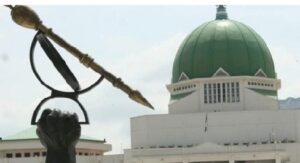See How Controversial Tax Reform Bills Spark Division in National Assembly
See How Controversial Tax Reform Bills Spark Division in National Assembly

National Assembly Complex
The tax reform bills introduced by President Bola Tinubu’s administration have sparked a sharp division among members of the National Assembly.
On September 3, the President presented four key tax reform bills to the legislature for consideration. These reforms are based on recommendations from the Presidential Committee on Fiscal and Tax Reforms, chaired by Taiwo Oyedele, which sought to review and update Nigeria’s tax laws.
The proposed bills include: the Nigeria Tax Bill 2024, which aims to set a comprehensive fiscal framework for the country’s taxation system; the Tax Administration Bill, designed to establish a clearer legal framework for all taxes in Nigeria and minimize disputes; the Nigeria Revenue Service Establishment Bill, which will replace the Federal Inland Revenue Service Act and create a new Nigeria Revenue Service; and the Joint Revenue Board Establishment Bill, which will establish a tax tribunal and a tax ombudsman.
The most contentious aspect of the bills is the shift to a derivation-based model for the distribution of Value Added Tax (VAT). Under this model, VAT revenue would be allocated to the states where goods and services are consumed, rather than where companies are headquartered.
This proposed model has met with strong opposition from the 19 northern governors and traditional leaders. Speaking under the Northern Governors’ Forum, they rejected the new VAT distribution plan, claiming that the bills did not reflect the interests of the northern region or other subnational entities.
The National Economic Council (NEC), led by Vice President Kashim Shettima, has also called for the withdrawal of the bills to allow for further consultation and consensus-building.
Although the bills have yet to be debated in their second reading, where the general principles of the bills will be discussed, a number of lawmakers have expressed concerns. Senator Ali Ndume (APC, Borno South) publicly opposed the bills, pledging to rally northern lawmakers against them.
Senator Ogoshi Onawo from Nasarawa South also criticized the bills, arguing that it was unfair for the government to impose additional taxes on Nigerians already struggling with economic hardship. He accused the Tinubu administration of being insensitive to the challenges faced by ordinary Nigerians and called for the bills to either be withdrawn or revised to incorporate the concerns of the public.
“The timing is wrong given the current economic challenges. The government is imposing more taxes on citizens who are already struggling. Taxation is not inherently bad, but when the people don’t see tangible benefits like improved infrastructure or social services, it feels unfair,” Onawo remarked.
A lawmaker from the North-Central region, who spoke anonymously, assured that the bills would be thoroughly examined, with Nigerians having a chance to voice their opinions during the process.
In contrast, representatives from the South-West have dismissed fears that the new tax regime would marginalize any region. Babajimi Benson, a member of the House of Representatives from Ikorodu, Lagos State, defended the reforms, stating that the current tax system was ineffective, and that the proposed changes would address longstanding issues in tax management.
Benson also sought to reassure the public that the new VAT distribution model would not disadvantage any state, noting that significant revenue comes from states like Kano, Kaduna, Rivers, and Lagos. He suggested that the Federal Government could use a five percent allocation as an equalizing mechanism to ensure fairness across all states.
Osun State lawmaker Oluwole Oke also acknowledged the controversy surrounding the bills, but emphasized that the National Assembly would give the public an opportunity to contribute to the debate, ensuring the reforms reflect societal needs and realities.
When contacted for comment, Taiwo Oyedele confirmed that plans for further engagement with stakeholders, including governors and the public, were already underway.
The debate over the tax reform bills is expected to take center stage when the National Assembly reconvenes from its one-week oversight break on November 19.
TRENDING SONGS
 NPMA Appeals to Nigerian Government for Compensation After Lagos Market Fire
NPMA Appeals to Nigerian Government for Compensation After Lagos Market Fire
 Rest Every Four Hours, FRSC Issues Safety Guide for Fasting Motorists
Rest Every Four Hours, FRSC Issues Safety Guide for Fasting Motorists
 NNPC Boss Ojulari Bags UK Energy Institute Fellowship
NNPC Boss Ojulari Bags UK Energy Institute Fellowship
 Shock in Anambra: Bride Disappears Moments Before Wedding
Shock in Anambra: Bride Disappears Moments Before Wedding
 Nigerian Woman Returns ₦330 Million Accidentally Credited to Her Account
Nigerian Woman Returns ₦330 Million Accidentally Credited to Her Account
 APC Don Reach Morocco?’ VeryDarkMan Reacts to Seyi Tinubu Poster
APC Don Reach Morocco?’ VeryDarkMan Reacts to Seyi Tinubu Poster
 Bride Breaks Down in Tears as Wedding Meals Were Kept Secretly While Guests Go Home Hungry
Bride Breaks Down in Tears as Wedding Meals Were Kept Secretly While Guests Go Home Hungry
 Odogwu by Day, Robber by Night: How Marriage Joy Turned Into Tragedy
Odogwu by Day, Robber by Night: How Marriage Joy Turned Into Tragedy
 Nigerian Officials Allegedly Pocket N4–6B Weekly Through Smuggling Cartels at Seme–Badagry Border
Nigerian Officials Allegedly Pocket N4–6B Weekly Through Smuggling Cartels at Seme–Badagry Border
 Ahmad Yerima: Naval Officer to Face No Sanctions After Clash with Wike – Matawalle
Ahmad Yerima: Naval Officer to Face No Sanctions After Clash with Wike – Matawalle
Share this post with your friends on ![]()













